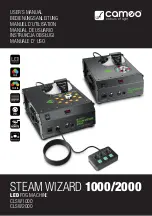
i
LK3-B448E MARKII/BA-16
............. This symbol ( ) indicates something that you should be careful of. The picture inside
the triangle indicates the nature of the caution that must be taken.
(For example, the symbol at left means “beware of injury”.)
............. This symbol ( ) indicates something that you must not do.
............. This symbol ( ) indicates something that you must do. The picture inside the circle
indicates the nature of the thing that must be done.
(For example, the symbol at left means “you must make the ground connection”.)
The instructions which follow this term indicate situations where failure to follow the
instructions will almost certainly result in death or severe injury.
SAFETY INSTRUCTIONS
Thank you very much for buying a BROTHER sewing machine. Before using your new machine, please read
the safety instructions below and the explanations given in the instruction manual.
With industrial sewing machines, it is normal to carry out work while positioned directly in front of moving parts
such as the needle and thread take-up lever, and consequently there is always a danger of injury that can be
caused by these parts. Follow the instructions from training personnel and instructors regarding safe and correct
operation before operating the machine so that you will know how to use the machine correctly.
This instruction manual and the indications and symbols that are used on the machine itself are provided in
order to ensure safe operation of this machine and to prevent accidents and injury to yourself or other people.
The meanings of these indications and symbols are given below.
Safety indications and their meanings
CAUTION
The instructions which follow this term indicate situations where failure to follow the
instructions could cause injury when using the machine or physical damage to
equipment and surroundings.
Indications
DANGER
z
Symbols



































